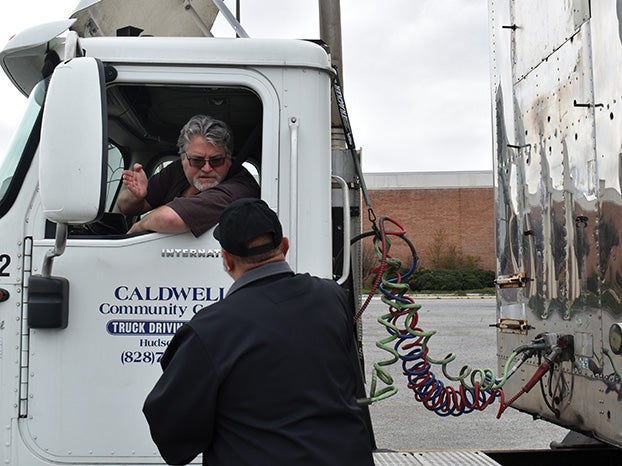‘There’s plenty of room’: Rowan-Cabarrus course prepares truck drivers to fill industry need
Published 12:10 am Thursday, March 31, 2022
SALISBURY — Murphy’s Law holds that “anything that can go wrong will go wrong.”
DeMarcus Jenkins, a truck driver, has his own version of that mantra.
“It’s trucking, it’s going to happen.”
Jenkins tells this phrase to beginning truck drivers to brace them for the flat tires and grinding traffic they’re likely to face sooner or later. Despite those difficulties, Jenkins likes what he does and encourages others to join the profession.
“I love it,” Jenkins said. “I go home and spend time with my family, but I’m always ready to get back on the road.”
Jenkins might not be on the road if it wasn’t for Rowan-Cabarrus Community College’s truck driver training program. He graduated from the program in May 2021 and has been driving since. The program, which helps students get their Class A Commercial Driver’s License, has become one of the college’s most popular continuing education courses and is helping fill a glaring need for drivers in the freight hauling industry.
For years, American companies have been dealing with a shortage of truck drivers. An analysis published in 2019 by the American Trucking Association traced the shortfall back to 2005, when the industry was short 20,000 drivers. A report published by the same organization last year showed the gap has widened even further. The industry is now short 80,000 drivers and will likely be in need of 160,000 drivers by 2030.
The shortage has been exacerbated by the COVID-19 pandemic, says Tony Barlow, a part-time instructor with Caldwell Community College and Technical Institute who teaches RCCC truck driving students.
“When COVID hit, a lot of drivers quit driving, whether they got sick or couldn’t get back out on the road again for whatever reason,” Barlow said.
With truckers responsible for moving more than 71% of the United States economy’s goods, that could pose a problem.
“The way things are transported, at some point they’re going to come out of a truck,” said Tashina Mahatha, who oversees the truck driving program for RCCC. “As the economy increases and the need for things increases, I think the demand will steadily increase.”
There are 757 vacant truck driver jobs in the area, according to a market study conducted by RCCC. That’s poised to increase, Mahatha said, if more online retail companies like Chewy move into Rowan County.
RCCC launched its truck driver training program in 2016. At the time, the college wasn’t sure how the program would be received.
“We didn’t buy anything because we didn’t know what that commitment would be here,” RCCC President Carol Spalding said recently at a Rowan County Board of Commissioners’ meeting.
The college formed a partnership with Caldwell Community College and Technical Institute to use its vehicle for training. That partnership is still in place today, with instructors from Caldwell using the college’s trucks to teach RCCC students.
Any concerns about how much interest there would be in the program were quickly quieted.
“We always were able to make our classes,” Mahatha said. “We never had a class canceled.”
Demand has continued to rise. Mahatha said there are currently about 300 people on a waiting list for the program. The college only has the capacity to offer three classes per year, each with about 18 students. Each course is roughly 364 hours, including 64 hours of classroom training and 300 hours of hands-on learning. Classes meet Monday through Friday from 8 a.m. to 5 p.m. at West End Plaza. The class recently relocated to the former mall parking from the former Intimidators stadium in Kannapolis, which is poised for redevelopment.
New federal regulations could funnel even more students to the program. The Entry-Level Driver Training regulations, which took effect on Feb. 7, established a national standard for obtaining a commercial driver’s license. Drivers now need to get formal training from a registered training provider like RCCC instead of simply passing a written test and driving test.
“There was already a lot of interest but that really increased it as well,” Mahatha said.
Several of the students who are currently wheeling trucks around West End Plaza said they’d been on a waiting list for the class since fall.
With demand for the class at an all-time high, Maratha said RCCC is exploring ways to offer more classes and help more students prepare for truck driving careers.
Mahatha said there are plenty of job opportunities for people interested in obtaining their CDL. In fact, Mahatha said most students get hired before they even complete the college’s program.
“I have employers all the time asking for graduates or wanting to speak to a class,” Mahatha said.
The current demand for truck drivers is one reason why Tim Boland, a retired engineer who worked for the North Carolina Department of Transportation, decided to enroll in the class and launch a second career. There are plenty of other reasons, Boland said, including the ability to see more of the country.
Shay O’Neal, one of Boland’s classmates, said she decided to enroll because she wants to master a new skill and improve her earning potential. Tan Blakeney and Shay Waddell-Williams, both leaving the healthcare industry to become truck drivers, said the potential of landing a higher paying job attracted them as well.
Mahatha said the starting salary for truck drivers is still around $50,000, but noted that companies are more willing now than before to offer raises and higher salaries to experienced drivers. That’s a high payoff, she said, for taking a class that lasts only a couple months.
O’Neal, Blakeney and Waddell-Williams are three of eight women currently taking RCCC’s class. That’s the most Barlow has ever taught at one time. Females comprise just 6.6% of truck drivers, according to the U.S. Department of Labor. Barlow, who spent 15 years driving trucks as well, said that could be changing.
The students currently enrolled in the class have started to learn how to back up. A few have already driven out on the road with supervision. But there’s still plenty to be learned before they graduate in May and take the final test needed to obtain their CDLs.
Jenkins is happy to see more people joining him on the road.
“There is definitely room for more truckers out here and when I mean room, there’s plenty of room,” Jenkins said. “And folks can make plenty of money.”
When the current crop of students in the class is ready to hit the road, Jenkins has some advice for them: always be prepared for something to go wrong.
More information about RCCC’s training course can be found by contacting Mahatha at tashina.mahatha@rccc.edu or by calling 704-216-7142.






